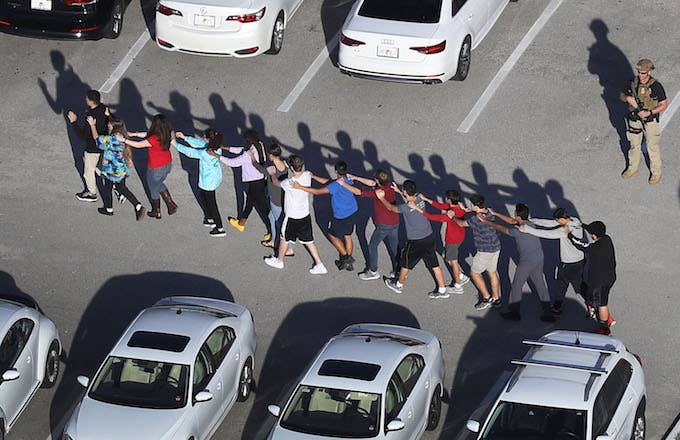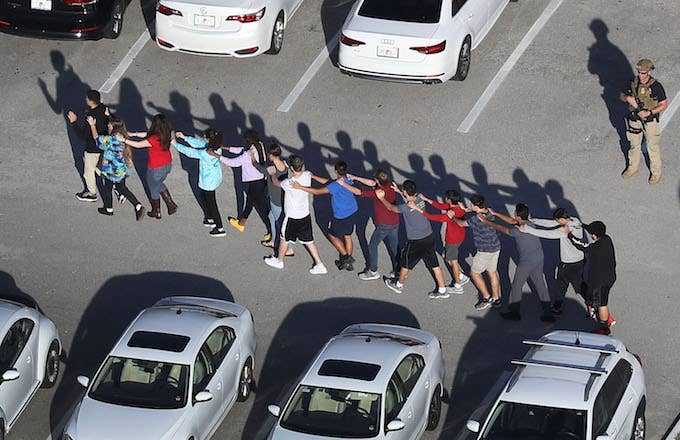
We’re here again.
The list you’re about to read was written in December of 2015 after the San Bernardino shooting, when we were fed up and exhausted by the inaction of our country on the issue of gun violence. At that point, there had already been 350 mass shootings that year. There would be 20 more that month. 2016 saw 477. 2017 was 727. Yesterday, Parkland, Florida brought us the 41st of 2018. This is an epidemic and nothing is changing.
In fact, it’s getting worse.
Almost a year ago, President Donald Trump signed a bill revoking gun checks for applicants with mental illness—a move the NRA was thrilled about. That same president is currently mired in negotiations to build an expensive border wall to combat a problem we don’t actually have. A problem we do have? White men with guns.
Never mind that most mass shootings are perpetrated by white men. Never mind that almost all shooters have histories of domestic violence or an association with the white supremacist movement. Never mind that the current administration not only knows this but actively covers it up by removing domestic terrorists from terrorism stats. Never mind that same administration’s history of covering for abusers and white supremacists on staff. Never mind that this president, in his address to the nation about this tragedy after a day of being AWOL, blamed it on mental health issues that would not have prevented the adult shooter from getting his AR-15 because of Trump’s very own legislation. We should note that this shooter seems to have been mentally fit—fit enough to train with white supremacists in Tallahassee.
But maybe this one will be different.
We all said that after Sandy Hook. We repeated it after Orlando and Las Vegas. Maybe this time, with cell phone camera footage and children on national TV begging adults to save their lives, something will happen. Maybe this time, as we yet again taste the victims’ fear and terror, something in the collective hearts of Congress will shift.
Because it is Congress who has to do it.
Common sense gun reform is supported not just by the majority of Americans but also NRA members. But not Congress. It is Congress, after all, where the NRA throws their money. It is Marco Rubio—whose constituents were just murdered—who asked for a pause before looking for a political resolution, and who was given $90K by the gun lobby in the last election and $3.3M over his career. He represents people who want gun reform. He represents people who are being murdered for lack of gun reform. But the people who give him money don’t want gun reform, so that’s how he votes. And that’s how most of this Republican Congress votes.
The last 13 months have found a country that’s ready to speak truth to power. We marched for gender equality. We flooded airports in the face of the Muslim ban. We called until our dialing fingers burned when the ACA was threatened. And each time, something shifted. It’s time to speak up about gun control. Not just as keyboard crusaders, but as people who won’t stop putting feet on the ground until there’s legislation on the books.
Here are a few ideas of how we could get something done.
(Below is the original article, published Dec. 4, 2015)
Here we are again. There’s been another mass shooting in America—the 355th this year—and yet, our government has yet to take any meaningful action to prevent something like this from happening again. Except maybe praying.
The possibility of being shot shouldn't be an inevitability. Something has to change. Gun-rights activists (yes, it’s still a thing) will argue that Wednesday's shooting happened despite the fact that California has some of the strictest gun laws in America—as if state lines were mystical boundaries where nothing passes through.
They will cite New York City or Chicago's high gun-crime rates (despite stricter laws), overlooking the fact that a huge percentage of said guns were purchased from out-of-state or counties where there are looser gun laws. What's more, if you look at gun deaths per capita, the deadliest states have some of the most relaxed gun laws (and neither New York or Illinois make the list).
Then there is perhaps the most maddening argument of all: that guns will be obtained by those who want them regardless of whether they're legal or not. Using this as an argument against changing our gun laws is foolish—people die from the flu every year, but we still wash our hands and get flu shots.
This issue isn't about "coming for your guns"; Americans' Second Amendment rights are safe. It's about a system that knowingly leaves the door open for people who want to hurt others. If a convicted killer on parole walks out of prison and buys a gun, it’s 100% legal. But we can change all that.
If we adopt one or all the following laws, they won’t go into effect immediately. But it's better than watching these events unfold over and over again, becoming deadlier and more frequent, and remaining unwilling to take action:
1. National weapon licensing
We require different licenses for different vehicles, including cars, motorcycles, and trucks. We do this for our own safety because each is handled differently.
So, it only makes sense that we also demand weapon licenses for different weapons: handgun license for handguns; rifle license for rifles. They’re complex machines that must be understood properly to be used safely. Your neighbors deserve to know that you’ve reached a certain level of proficiency before being within range. Will this mean that lunatics won’t get guns? No. But licensing will greatly curb the number of gun accidents we have every year that kill thousands.
2. Require microstamping
Any newly fabricated firearms should have microstamping, which places an ID tag on every shell casing of every bullet fired (there’s a stamp on the firing pin, embossing the ID when the bullet is fired). Gun makers have access to this technology, and it adds very little to the overall cost of manufacturing a weapon, so prices would not increase by much.
To those who say this practice is unfair to good, law-abiding people: If they're genuinely good, they shouldn't have anything to worry about. Will this mean that lunatics won’t get guns? No. But microstamping would expedite all investigations that deal with gun violence, vastly reducing the possibility that the same shooter makes multiple strikes before getting caught.
Unless you’re shooting people unjustifiably, this would not affect you.
3. National weapon registration
We should require every weapon to be registered to its owner, so ownership can't be traded or sold without updating the registration. We do this with our cars; we need to do this with our weapons.
Like microstamping and weapon licensing, registration will provide us with a more robust way of tracking who owns which guns, and therefore make it easier to identify a gun's owner when it's used for criminal activity. Will this mean that lunatics won’t get guns? No. But it will be much harder for guns to fall into the grey and black markets.
Unless you want to use your weapon for a criminal act or evade arrest, this would not affect you.
4. Close the gun-show loophole
Currently, if you buy a firearm online or at a gun show, you're not required to pass a background check. That's right: It's legal to buy a gun without getting checked—and many people do.
Closing that loophole would mean that all gun sales, both private and public, must include a background check. We already know it works, and would solve potential issues. We already do this for retail purchases, so why not for gun shows? And good guys won't have to worry about passing background checks.
Will this mean that lunatics won’t get guns? No. Background checks don't stop everyone they should (human error meant Dylann Roof's admission of drug possession was overlooked and Jiverly Wong was exempted from a background check because it took longer than three business days to process, according to The New York Times). But they would throw up more red flags, lowering the possibility that firearms would land in the wrong hands.
Unless you'd fail a background check, this would not affect you.
5. National assault-weapons ban
If this happened, sale, ownership, and trade of assault weapons would be illegal. Sure, there’s the weak argument that California outlaws assault weapons, yet the San Bernardino shooting included AK-47s. But that's because you can buy them in other states and then travel elswhere (cars: we have them!).
We have to look at the whole picture, and avoid sticking our heads in the sand when it’s convenient just because we're in love with our "right" to easily kill living things. We must outlaw assault weapons nationally. They’re not for hunting. They’re not for defense. They are designed to kill as many people as possible, as quickly as possible, especially in wartime. So if you want to conceal and carry, and it’s legal in your state, fine. But you don’t need a kill-'em-all machine. Will this mean that lunatics won’t get guns? No. But it will greatly decrease their access to available weaponry.
This is the only law out of these five proposals that would "come for your guns," or curtail your current rights in any way. But, frankly, your right to an assault weapon is far less important than your neighbor's right to the pulse in their veins.
Unless your goal is to mow down a lot of people, this would not affect you.

